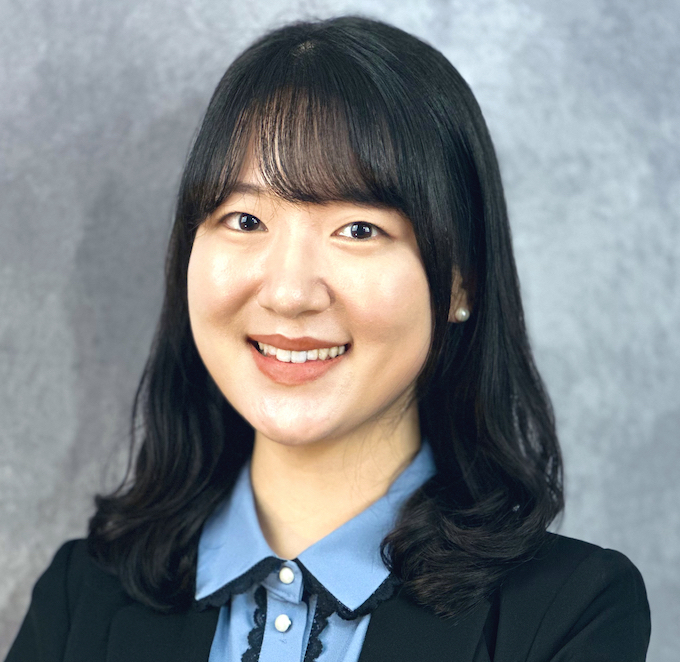Jeesung Ahn
ABOUT ME
Hi there! I’m Jeesung Ahn, a postdoctoral fellow at the Annenberg School for Communication at the University of Pennsylvania, working with Dr. Emily Falk. I’m passionate about using data and science to make a positive impact on people’s lives!
My research primarily focuses on understanding and enhancing social connections, tackling loneliness, and improving mental health. I’m particularly interested in identifying factors that increase the risk of loneliness and understanding the brain’s role in our social connections and isolation.
Additionally, I build models to evaluate how behavioral interventions can promote healthier behaviors, such as increasing physical activity. By leading multidisciplinary research projects, I aim to develop personalized strategies to enhance both physical and mental well-being.
As a health psychologist and neuroscientist, I strive to bridge the gap between data-driven insights and real-world applications, contributing to a healthier and more connected society.
Research Areas:
Social Connections, Loneliness, Mental Health, Health Persuasion, Behavioral Interventions, Behavior Change, Brain-as-Predictor, Brain-Behavior Relationships
Education:
- Ph.D. in Psychology, University of Pennsylvania (2024)
- M.S. in Cognitive Science and Engineering, Yonsei University
- B.A. in Psychology & B.S. in Brain and Cognitive Sciences, Korea University
RESEARCH METHODS
Over the past 9+ years, I have led comprehensive psychology and neuroscience research projects, focusing on human behavioral and neuroimaging data.
My research methods are multi-disciplinary and include the followings:
- Experimental and survey design (including A/B tests, usability tests)
- Data collection (recruiting, screening, surveys, experimental, behavioral, neuroimaging, experience sampling, in-depth interviews)
- Descriptive, parametric, non-parametric, and multivariate statistics
- Regression analysis (e.g., general linear modeling)
- Multilevel modeling
- Time-series analysis
- Signal processing (e.g., denoising, despiking, temporal filtering of fMRI signals)
- Computational network analysis (brain networks, social networks)
- Machine learning
- Meta-analysis of multidimensional datasets
- Qualitative content analysis (including text analysis)
These methods allow me to conduct thorough and rigorous research, contributing valuable insights to the fields of psychology and neuroscience.
SELECTED PROJECTS
Here is an overview of my selected research projects. If you have any questions or would like to discuss further, feel free to email me at jeesung@sas.upenn.edu. I’m always happy to chat!
Data-Driven Strategies for Healthier Living
SANS 2022 Poster (top poster award winner) Preprint

In this extensive mega-analysis of neuroimaging (fMRI) and physical activity behavioral datasets (N=366), I found that the effectiveness of health message interventions in promoting physical activity can be predicted by the interplay between message characteristics (e.g., gain vs. loss framing) and individual factors (e.g., baseline physical activity levels).
OSF Preregistration Study Protocol
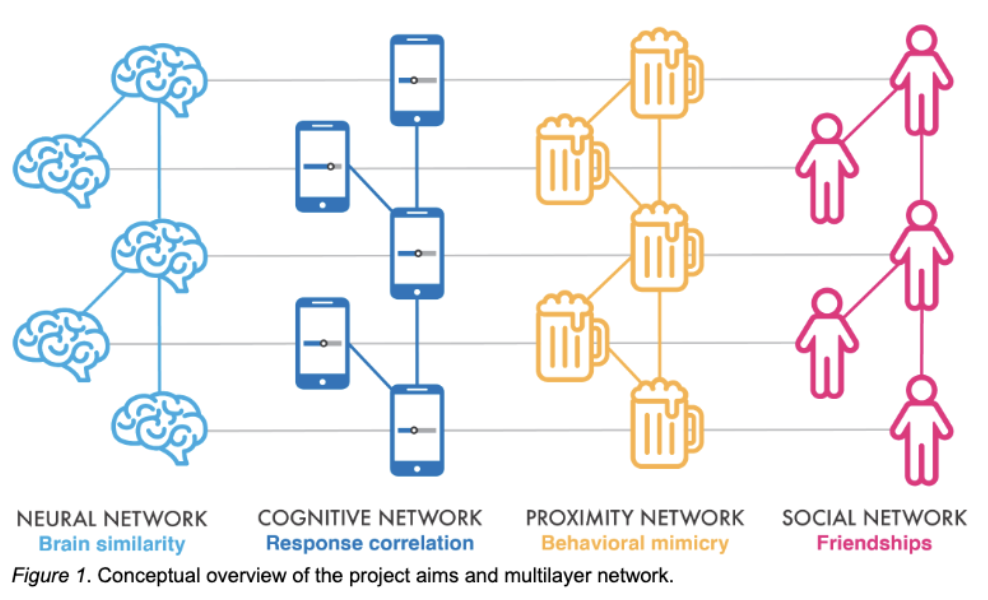
I ran multi-level models to examine whether the modular organization of functional connectivity networks in the brain (measured by fMRI) can explain real-world associations between alcohol craving and drinking in non-dependent social drinkers (measured by daily experience sampling for one month).
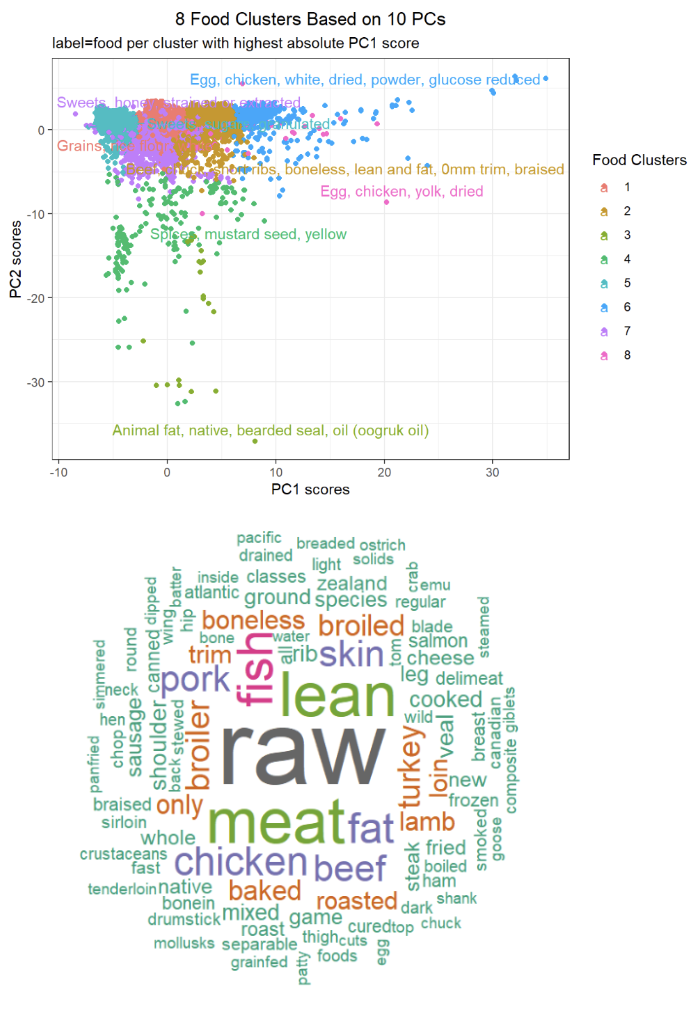
My goal was to create a data-driven algorithm that provides personalized food recommendations based on an individual’s dietary needs. I performed exploratory data analyses and unsupervised machine learning (PCA, K-means clustering) on a dataset with 5690 (food) x 154 (nutrients) dimensions. This approach allowed me to cluster the food items into 8 distinct categories and simulate real-world scenarios to provide tailored food recommendations for individuals with dietary restrictions.
Connecting Mental Well-Being with Networks in the Brain and Society
Dissertation
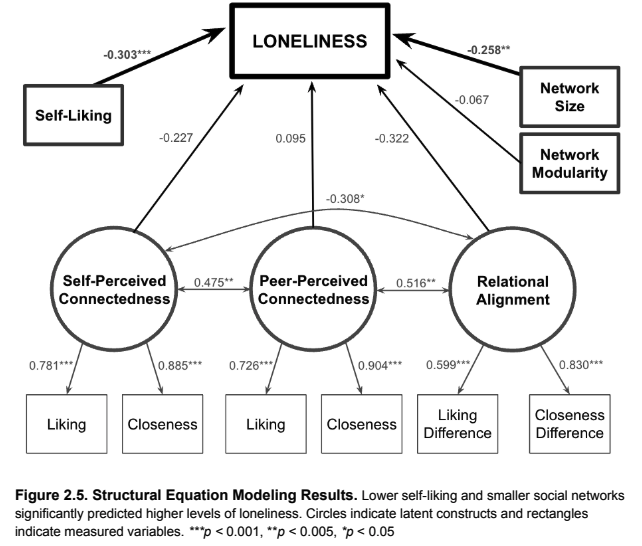
This study explored how internal self-perception and social networks relate to loneliness. We recruited 111 participants from various university social groups and used a round-robin design to measure social connectedness. Key variables included self-liking, bidirectional social connectedness, and structural characteristics of social networks, such as size and modularity. Using structural equation modeling, I found that higher self-liking significantly correlated with reduced loneliness, making it the most significant predictor. Larger social networks were also associated with lower levels of loneliness. Interestingly, perceived connectedness with peers and network modularity did not significantly predict loneliness levels. These findings highlight the importance of positive self-perception and extensive social networks in mitigating loneliness among younger adults, suggesting new directions for interventions.
Dissertation
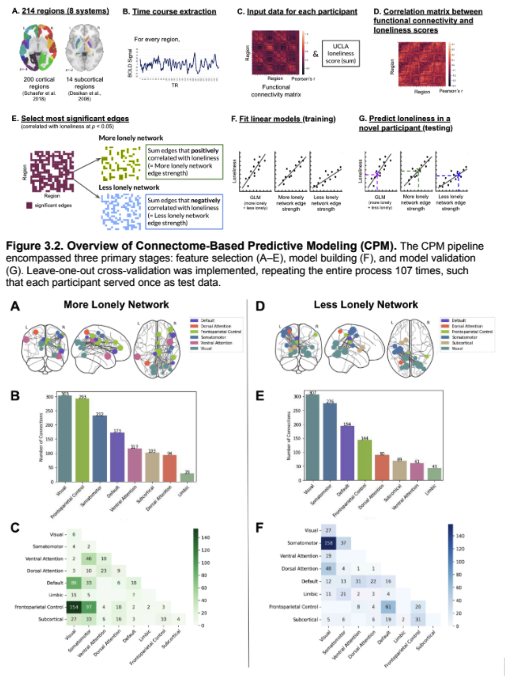
In this study, I developed a machine learning model to predict individual loneliness levels among college students (N = 107) using whole-brain functional connectivity networks. Participants viewed socially relevant stimuli (peer faces) inside an fMRI scanner. The results showed that loneliness could be predicted from functional connectivity patterns across eight brain systems. Key features included connectivity between the frontoparietal control, default mode, dorsal and ventral attention, visual, and somatomotor systems. Higher loneliness was linked to increased cross-modal connectivity between higher-order and lower-order systems, while lower loneliness correlated with greater connectivity within unimodal sensory-perceptual systems and the default mode system. These findings highlight potential neural markers of loneliness and suggest that brain functional connectivity, especially within the frontoparietal control and visual systems, is a significant predictor of loneliness.
SANS 2023 poster
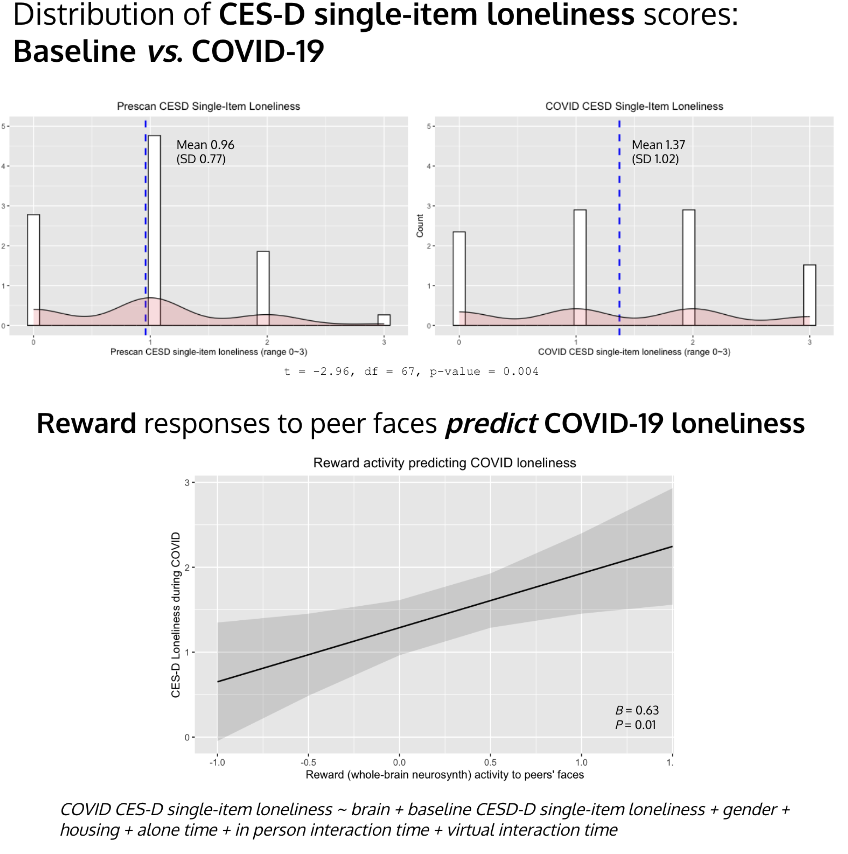
I tested whether neural responses to peers’ faces could predict changes in loneliness from before to after the COVID-19 pandemic. The findings indicated that lonelier individuals might place greater emotional importance on self-relevant social stimuli. Additionally, those who exhibited higher reward sensitivity to peers’ faces were more likely to experience increased loneliness during the pandemic.
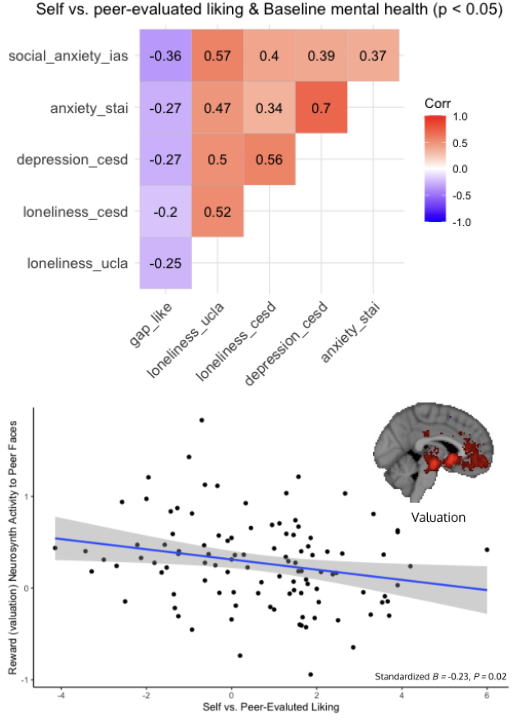
In this large-scale, multidisciplinary study, we used a Round Robin design to recruit entire members of campus social groups. Participants rated their own and their peers’ social status, including factors like likability, attractiveness, and influence. I focused on three key questions: 1) Is there a discrepancy between how individuals evaluate their own social status versus how their peers evaluate it? 2) Is under- or over-evaluating one’s social status associated with poorer mental health? 3) Is under- or over-evaluating one’s social status linked to greater consideration of others’ thoughts and feelings?
Brief Summary of Related Projects SfN 2018 Poster 1 SfN 2018 Poster 2
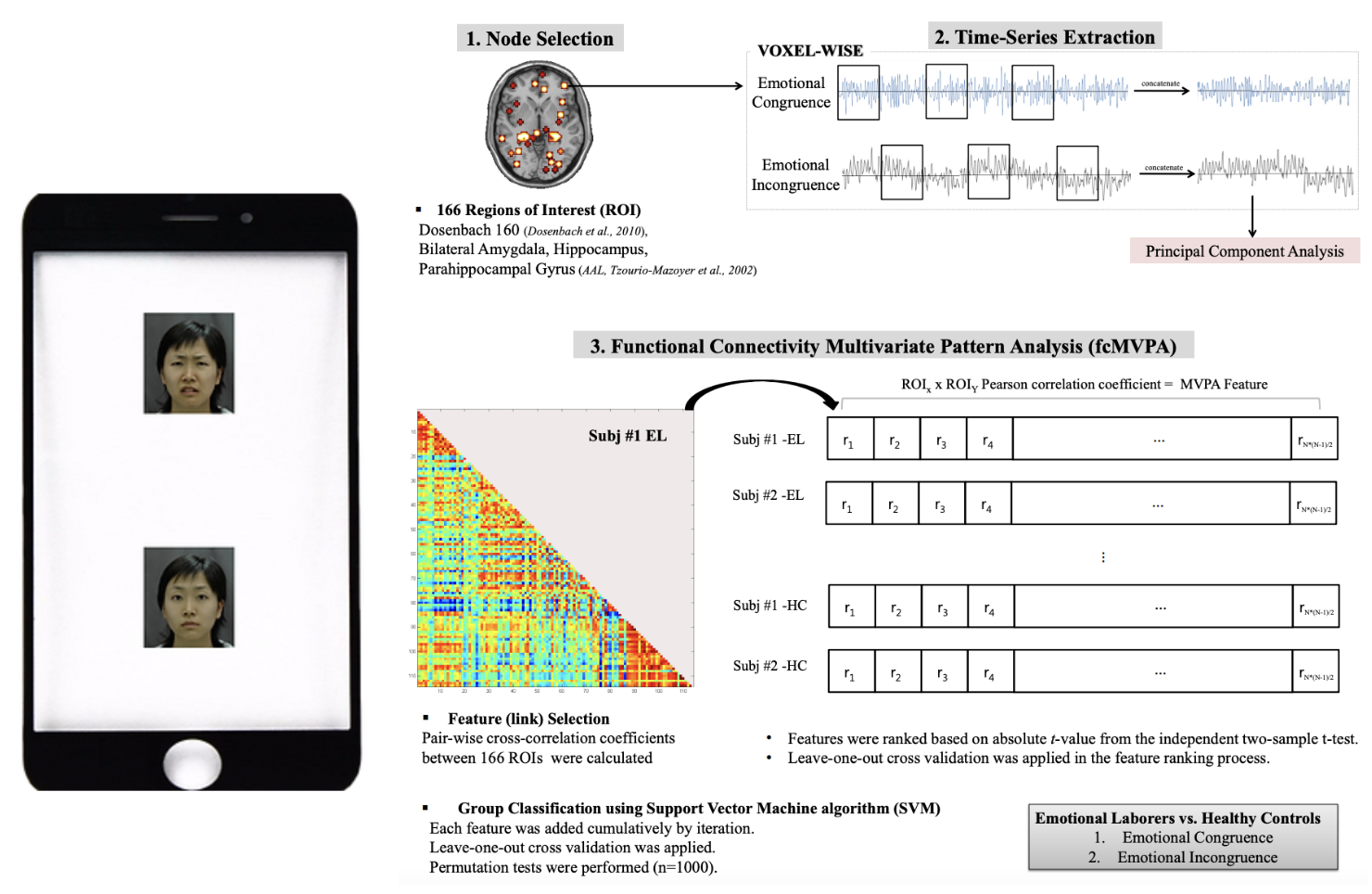
I designed and conducted A/B tests for a mobile application aimed at providing cognitive training to modify attentional bias towards negative social stimuli (Attentional Bias Modification, ABM). To test the app, I recruited healthy controls, individuals with social anxiety, and call center workers experiencing high emotional stress at their workplaces. Participants performed the ABM task both inside an fMRI scanner and on their smartphones. We used machine-learning classification of brain functional connectivity networks during the ABM task and discovered that socially distressed individuals exhibited an attentional bias towards negative faces (compared to neutral faces) at both behavioral and neural levels.
Publication
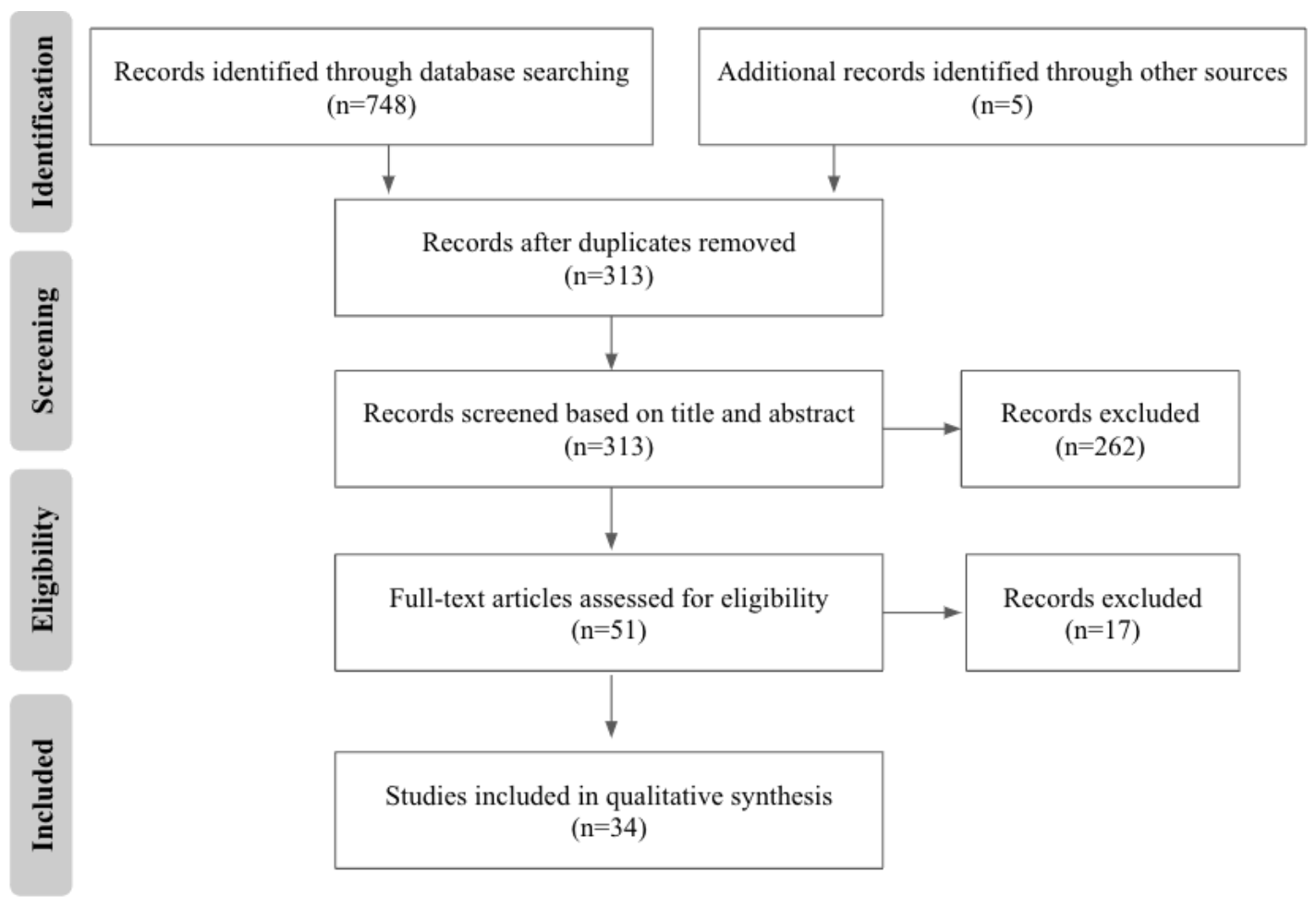
I conducted a qualitative review of literature examining the effects of interventions designed to address two major public health concerns: physical inactivity and loneliness. My goal was to identify which aspects of these interventions most effectively improve physical activity and/or reduce loneliness, and to explore whether these two variables are bi-directionally related. I proposed a psychological framework suggesting that positive social experiences may underlie the relationship between loneliness and physical activity.
Repetitive negative thoughts, or perseverative thoughts (PT), are a significant feature of many mental disorders and a strong predictor of poor clinical outcomes. Despite their recognized importance as a source of impairment and an intervention target, PT remains challenging to treat. In this study, we used network control theory (NCT) analysis to investigate whether individuals with clinical levels of perseveration exhibit more temporally persistent brain states when they need to ‘turn off’ negative thoughts to perform a basic cognitive task. I was responsible for documenting, wrangling, and engineering the behavioral and fMRI dataset.
Other Neuroimaging Projects
Publication SfN 2017 Poster
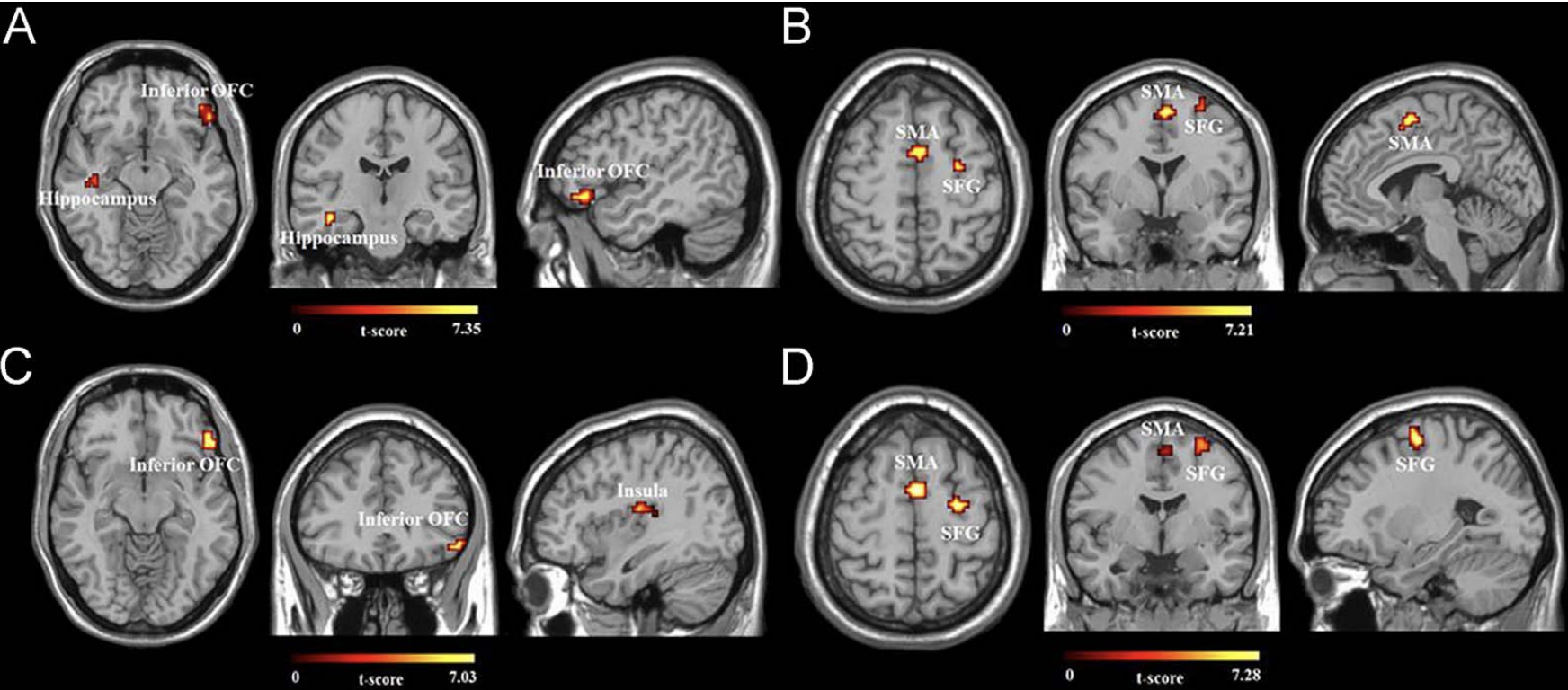
I conducted A/B testing on a novel neurostimulation device (transcranial direct current stimulation, tDCS) to examine its effects and safety in enhancing cognitive abilities in younger adults, particularly focusing on attentional allocation. Specifically, I explored whether an electric intensity lower than 0.5mA could influence the activity of the default mode network (DMN) in the brain. Using group independent component analysis (ICA), I found that low-intensity tDCS altered the intrinsic co-activation of brain regions within the DMN.
Yonsei Interdisciplinary Research Award Winner
In collaboration with electrical engineers, I applied a deep-learning algorithm (convolutional neural network, CNN) to conventional low-resolution fMRI data (3.75 × 3.75 × 4 mm voxel size) and successfully converted them into high-resolution (1.5 mm isotropic voxel size) images.
PUBLICATIONS
Peer-Reviewed Articles
Ahn, J., Falk, E.B., & Kang, Y. (2024). Relationships between physical activity and loneliness: A systematic review of intervention studies, Current Research in Behavioral Sciences
Kang, Y., Ahn, J., Cosme, D., McGowan, A., Mwilambwe‐Tshilobo, L., Zhou, D., Jovanova, M., Stanoi, O., Mucha, P., Ochsner, K., Bassett, D., Lydon‐Staley, D., & Falk, E.B. (2023). Frontoparietal functional connectivity moderates the link between time spent on social media and subsequent negative affect, Scientific Reports
Zhou, D., Kang, Y., Cosme, D., Jovanova, M., He, X., Mahadevan, A., Ahn, J., Stanoi, O., Brynildsen, J., Cooper, N., Cornblath, E., Parkes, L., Mucha, P.J., Ochsner, K., Lydon-Staley, D.M., Falk, E.B., Bassett, D.S. (2023). Mindful attention promotes control of brain network dynamics for self-regulation and discontinues the past from the present , PNAS
Kang, Y., Cosme, D., Lydon‐Staley, D.M., Ahn, J., Jovanova, M., Corbani, F., Lomax, S., Stanoi, O., Strecher, V., Mucha, P.J., Oschner, K., Bassett, D.S., Falk, E.B. (2022). Purpose in life, Neural Alcohol Cue Reactivity, and Daily Alcohol Use in Social Drinkers, Addiction
Ahn, J., Nah, Y., Ko, I., Han, S. (2022). Voxel-wise Mapping of Functional Magnetic Resonance Imaging in Impression Formation, Science of Emotion and Sensibility
Ahn J., Lee, J., Han, J., Kang, M., Han, S (2018). Group Analysis Data Representing the Effects of Frontopolar Transcranial Direct Current Stimulation on the Default Mode Network, Data in Brief
Ahn, J†., Kim, H†., Park, J., Han, S. (2018). Interactivity of Neural Representations for Perceiving Shared Social Memory, Science of Emotion and Sensibility
Preprints
Ahn, J., Cooper, N., Kang, Y., O’Donnell, M., Green, M., Samanez‑Larkin, G., & Falk, E.B. (2024). Effects of framing on neural responses to persuasive messaging and physical activity. Under review & preprinted at PsyArXiv.
Cosme, D., Helion, C., Kang, Y., Lydon‑Staley, D.M., Doré, B.P., Stanoi, O., Ahn, J., Jovanova, M., McGowan, A.L., Kober, H., Mucha, P.J., Bassett, D.S., Ochsner, K.N., & Falk, E.B. (2023). Mindful attention to alcohol can reduce cravings in the moment and consumption in daily life. PsyArXiv
Cosme, D., Kang, Y., Carreras Tartak, J., Ahn J., Corbani, F., Cooper, N., Doré, B., He, X., Helion, C., Jovanova, M., Lomax, S., Mahadevan, A., McGowan, A.L., Paul, A., Pei, R., Resnick, A., Stanoi, O., Zhang, Y., Bassett, D.S., Boyd, Z.M., Lydon-Staley, D.M., Mucha, P.J., Ochsner, K., Falk, E.B. (2022). Study protocol: Social Health Impact of Network Effects (SHINE) Study, PsyArXiv
Working Papers
Ahn, J., Kang, Y., Mwilambwe‑Tshilobo, L., Cosme, D., Bassett, D.S., Zachary, B., Lydon‑Staley, D., Mucha, P., Ochsner, K., & Falk, E.B. Task‑evoked brain networks predict individual experiences of loneliness. In preparation (manuscript writing)
Ahn, J., Mwilambwe‑Tshilobo, L., Kang, Y., Cosme, D., Bassett, D.S., Zachary, B., Lydon‑Staley, D., Mucha, P., Ochsner, K., & Falk, E.B. Longitudinal analysis of loneliness through task‑evoked brain networks in times of social isolation. In preparation (manuscript writing)
Ahn, J., Mwilambwe‑Tshilobo, L., Kang, Y., Cosme, D., Bassett, D.S., Zachary, B., Lydon‑Staley, D., Mucha, P., Ochsner, K., & Falk, E.B. The architecture of loneliness: How self‑perception and social networks shape perceived social isolation. In preparation (manuscript writing)
Ahn, J., Cosme, D., Kang, Y., Zachary, B., Ochsner, K., Mucha, P., Lydon‑Staley, D., Bassett, D.S., & Falk, E.B. Segregation and integration of brain functional connectivity networks moderate craving‑drinking relationships in daily life. In preparation (manuscript writing) preregistered
Zhou, D., Ahn, J., Falk, E.B., Bassett, D.S., & Ruscio, A. Brain network dynamics predict perseverative thoughts in depression and anxiety. In preparation (data analysis)
Scholz, C., Chan, H.-Y., Ahn, J., Boksem, M., Cooper, N., Doré, B., Genevsky, A., Husky, R., Kang, Y., Knutson, B., Lieberman, M., O’Donnell, M., Resnick, A., Smidts, A., Venkatraman, V., Weber, R., Vo, K., Yoon, C., Falk, E.B., Brain Activity Predicts and Explains Persuasive Message Effectiveness: A Mega-Analysis of 16 Neuroimaging Studies. Under Review
PRESENTATIONS
Invited Talks
Ahn, J., Cooper, N., Kang, Y., O’Donnell, M., Green, M., Samanez-Larkin, G., & Falk, E.B. (May, 2022). Brain responses to gain- and loss-framed messages differ, and interact with baseline physical activity, to predict later behaviors, Social and Affective Neuroscience Society 2022 Annual Conference, Virtual. Top poster award
Ahn, J., Richards, K., Ortiz, T. (April, 2021). Recommendations for an intelligent diet, Wharton Data Science Live 2021, Virtual
Conference Posters
Ahn, J., Mwilambwe‑Tshilobo, L., Bassett, D., Boyd, Z., Lydon‑Staley, D., Mucha, P., Ochsner, K., & Falk, E.B. (2024, April). Brain networks as individual‑level predictors of longitudinal loneliness. Social and Affective Neuroscience Society 2024 Annual Conference, Toronto, Ontario, Canada (Travel Award winner)
Ahn, J., Kang, Y., Mwilambwe‐Tshilobo, L., Bassett, D., Boyd, Z., Lydon‐Staley, D., Mucha, P., Ochsner, K., & Falk, E.B. (2023, May). Neural responses to peers’ faces predict vulnerability to loneliness during COVID‐19. Annual International Communication Association Conference 2023, Toronto, Ontario, Canada
Kang, Y., Ahn, J., Cosme, D., McGowan, A., Mwilambwe‐Tshilobo, L., Zhou, D., Jovanova, M., Stanoi, O., Mucha, P., Ochsner, K., Bassett, D., Lydon‐Staley, D., & Falk, E.B. (2023, May). Frontoparietal system functional connectivity moderates the within‐day associations between increases in time spent on social media and subsequent negative affect. Annual International Communication Association Conference 2023, Toronto, Ontario, Canada (Promising Paper Award winner)
Jovanova, M., Boyd, Z., Schwarze, A., Christensen, T., Cosme, D., Katch, K., Ahn, J., Resnick, A., Cooper, N., Xie, H., Kang, Y., Lomax, S., McGowan, A., Mwilambwe‐Tshilobo, L., Stanoi, O., Srivastava, P., Ochsner, K., Bassett, D., Lydon‐Staley, D., … Mucha, P. (2023, May). Integrating multimodal data and machine learning to predict individual differences in health behavior change. Annual International Communication Association Conference 2023, Toronto, Ontario, Canada
Ahn, J., Kang, Y., Mwilambwe‑Tshilobo, L., Cosme, D., Jovanova, M., Bassett, D., Boyd, Z., Lydon‑Staley, D., Mucha, P., Ochsner, K., & Falk, E.B. (2023, April). Neural responses to peers’ faces predict vulnerability to loneliness during COVID‑19. Social and Affective Neuroscience Society 2023 Annual Conference, Santa Barbara, CA, USA
Ahn, J., Cooper, N., Kang, Y., O’Donnell, M., Green, M., Samanez‑Larkin, G., & Falk, E.B. (2022, May). Brain responses to gain‑ and loss‑framed messages differ, and interact with baseline physical activity, to predict later behaviors. Social and Affective Neuroscience Society 2022 Annual Conference, Virtual (Top Poster Award winner)
Ahn, J., Cooper, N., Kang, Y., O’Donnell, M., Green, M., Samanez-Larkin, G., & Falk, E.B. (May, 2022). Brain responses to gain- and loss-framed messages differ, and interact with baseline physical activity, to predict later behaviors, Annual International Communication Association Conference 2022, Paris, France
Kang, Y., O’Cosme, D., Ahn. J., Strecher, V., Lydon-Staley, D., Corbani, F., Jovanova, M., Stanoi, O., Lomax, S., Ochsner, K., Mucha, P., Bassett, D., & Falk, E.B. (May, 2022). Alcohol cue reactivity in the ventral striatum and daily purpose in life moderate the relationship between alcohol craving and consumption in college students, Annual International Communication Association Conference 2022, Paris, France
Cosme, D., Scholz, C., Chan, HY., Martin, R., Benitez, C., Cooper, N., Paul, A., Ahn, J., Dore, B., Resnick, A., Carreras-Tartak, J., & Falk, E.B. (May, 2022). Does focusing on self or social relevance during news article exposure increase motivation to share content?, Annual International Communication Association Conference 2022, Paris, France
Chan, H.-Y., Scholz, C., Cosme, D., Martin, R., Benitez, C., Cooper, N., Paul, A., Ahn, J., Dore, B., Resnick, A., Carreras-Tartak, J., & Falk, E.B. (May, 2022). Brain-based prediction of information virality: Evidence of cross-cultural validity from a pre-registered neuroimaging study, Annual International Communication Association Conference 2022, Paris, France
Ahn, J., Jun, S., Lee, J., Min, S., Lee, S-K., Park, S.H., & Han, S. (Nov, 2018) Altered emotional attention and brain functional connectivity networks of emotional laborers, Society for Neuroscience 2018 Annual Conference, San Diego, CA, USA
Min, S., Jun, S., Ahn, J., Lee, J., Lee, S-K., Park, S.H., & Han, S. (Nov, 2018) Intrinsic functional connectivity in emotion regulation network is altered in emotion laborers, Society for Neuroscience 2018 Annual Conference, San Diego, CA, USA
Lee, J., Lee, H-J., Ahn, J., Lee, S-K., Han, S. (June, 2018) Exploring the high-resolution EPI fMRI protocol to reduce susceptibility-related BOLD signal dropout, The Organization for Human Brain Mapping 2018 Annual Meeting, Singapore
Ahn, J., Han, J.H., Kang, M.S., & Han, S. (Nov, 2017) Frontopolar transcranial direct current stimulation changes intrinsic functional connectivity networks during resting-state fMRI, Society for Neuroscience 2017 Annual Conference, Washington DC, USA
Ahn, J., Nah, Y., & Han, S. (Nov, 2016) Voxel-wise Mapping of the Cingulate Cortex in Impression Formation, Society for Neuroscience 2016 Annual Conference, San Diego, CA, USA
Ahn, J., Nah, Y., & Han, S. (April, 2016) Patterns of Functional Connectivity during Preparation Periods Can Predict the Tendency to Give Up in Following Decision-Making, Cognitive Neuroscience Society 2016 Annual Conference, New York, NY, USA
VOLUNTEER ACTIVITIES
I’m passionate about using my research skills to turn scientific insights into practical solutions for complex decisions. To achieve this, I’ve actively engaged in various volunteer activities, working on projects that make a real difference in areas that matter to me.
Vice President of Consulting at Penn Graduate Consulting Club (May 2023 – Present):
- Directed 6 project managers and 30+ analysts in the successful execution of pro bono consulting projects
- Established strong relationships with 5+ industry clients within the first 2 months of joining the board, doubling the number of secured pro bono projects compared to the previous term
- Revamped marketing strategies to recruit talented staff, increasing member applications by 300%
- Initiated structured training sessions for 50+ project managers and analysts on client expectations, high-quality deliverables, and effective presentations
Consultant at Penn Biotech Group Healthcare Consulting (Sept.2022 – Jan.2023):
- Presented weekly deliverables to the CEOs of a biotechnology start-up as part of an 11-person graduate research team
- Evaluated 200+ company profiles and clinical trial data, identifying 4 partnership opportunities with the highest synergistic potential
- Interviewed 10 key opinion leaders in healthcare (e.g., physicians), synthesizing their insights into clear recommendations for clinical trial design.
- Recognized for exceptional contributions and subsequently recruited as Vice President of Consulting by the Penn Graduate Consulting Club
Data Scientist at Diversity and Equity Initiative in Mind Sciences (Mar. 2022 – Mar.2023):
- Designed online surveys to assess the effectiveness of education outreach programs
- Visualized program outcomes using R (e.g., text-analyzed participant feedback) and delivered actionable insights to program organizers to enhance the overall participant experience
Data Scientist at Penn Data Science Group (Feb. 2022 – May 2022):
- Synthesized air pollution and health outcome data from 6 public sources (100K+ data points) into an interactive heatmap, provided to inform climate policymakers

UX Research Consultant at Team QuantumLabs (Mar. 2016 – Feb. 2018):
- Directed research projects (A/B testing, surveys, lab experiments, and interviews) to assess user behavior and guide strategic product decisions for a novel neurostimulation device
- Communicated award-winning scientific insights with cross-functional stakeholders (venture capital funders, designers, engineers, and clinicians), acquiring $100K+ in funding development
For Fun
Stay tuned for my upcoming Kaggle projects where I’ll be predicting music chart positions (Billboard) and movie box office earnings!
Contact
Email: jeesung@sas.upenn.edu
LinkedIn: linkedin.com/in/jeesung-ahn/
